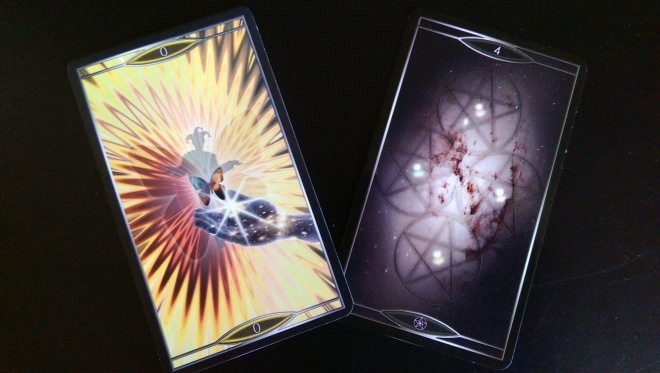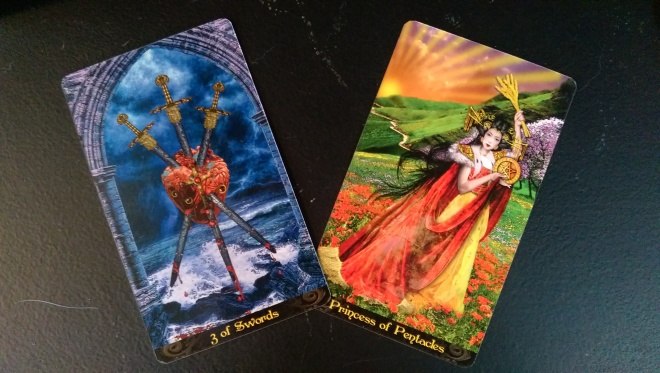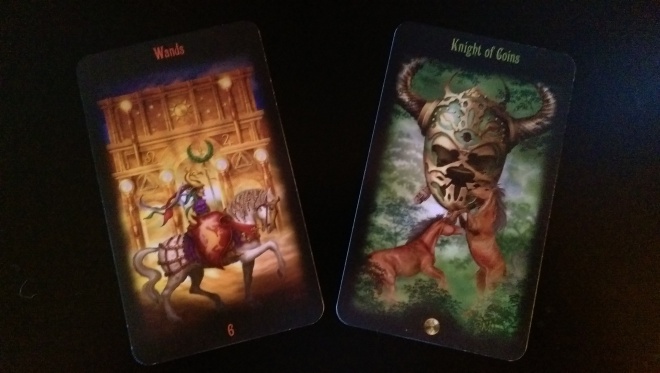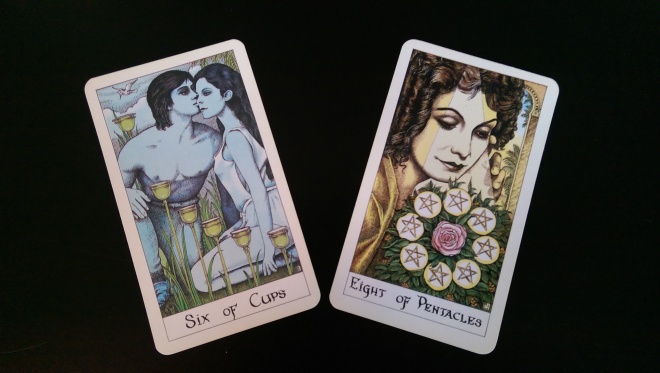
In this particular deck The Fool is portrayed as the Big Bang. You know, that astrophysical concept they teach in science, while forgetting to regularly remind students that it’s just a theory? Behemoth quantities such as 14,000,000,000 years ago which are capable of inducing astronomical ice cream headaches when trying to cognize them get thrown around. I wrote it in numerical form so all those zeros would force your eyes to cross.
Despite having a degree in metaphysical theology I’m not one to see Genesisian cosmology (I just made up that word) as barely more than allegory, yet when I compare this massively adulterated Sumerian origin story draped in anthropomorphic language to the fresh-out-of-the-autoclave science-based “I don’t know… it just happened” account of the forming of the Universe, I really don’t see much difference. In both, there was really nothing, then suddenly there was everything.
Let’s stroll over to the right and look at this deck’s portrayal of the Four of Pentacles. It is represented by a depiction of an elliptical galaxy. Basically, these type of galaxies don’t crank out very many new stars and as a result don’t have many young stars. Think of Branson, Missouri. Thus, they are mostly comprised of older stars and big black holes. They are essentially the Florida or Arizona of galaxies.
So what’s up with these types of galaxies? Why are they packing in the same old stars for eons of ages? With that big black hole in the middle keeping tight reins on everything, it’s suppressing the creation of all those new stars. Bastard.
This is the way I see the energy of this card. It states that we are holding onto something so tightly as a means of maintaining an iron-fisted sense of security. Change is the boogeyman threatening to crawl out from under our bed and consume us. Newness is the Jehovah’s Witnesses knocking at our door right when we’ve sat down with a dinner plate heaped with piping hot food. The unknown is a disruption, an annoyance and aggravation and inconvenience as we would have to go through the trouble of learning how to deal with a fresh situation or circumstance.
Staunch, rigid routines have the appearance of creating a nice safe stasis field, but in all actuality they rush us toward entropy. Ask how the preservation of the status quo is working out for the fly in ember. If we want to cling to an unwavering way of life, we will in the process (or lack thereof) create such stagnancy that it will inevitably become a vacuum. What did Aristotle say? Something about Nature abhorring a vacuum? We can substitute Nature for Life. If Life senses a vacuum being formed by those who “hate change”, it will seethe and punch them in the face. It will ensure an environment so inhospitable only the nastiest of creatures can thrive. Look at deserts and swamps, Nature’s poster children for stagnation. I once again reference Florida and Arizona.
Nothing keeps entropy at bay like a surprise. Life thrives when bursting through the opened door of which we had no clue as to what was behind it. Let us unlock the box of mystery and dump its contents on our dusty floor. Let us choose to take the action of which we have no idea of its outcome, for that choice leads to renewed life.





